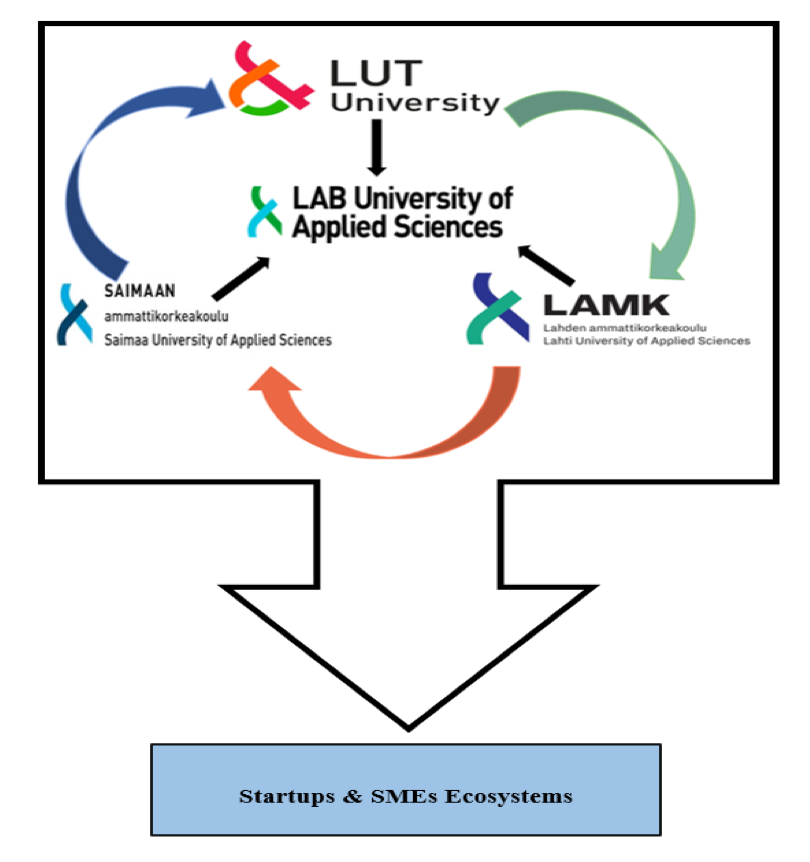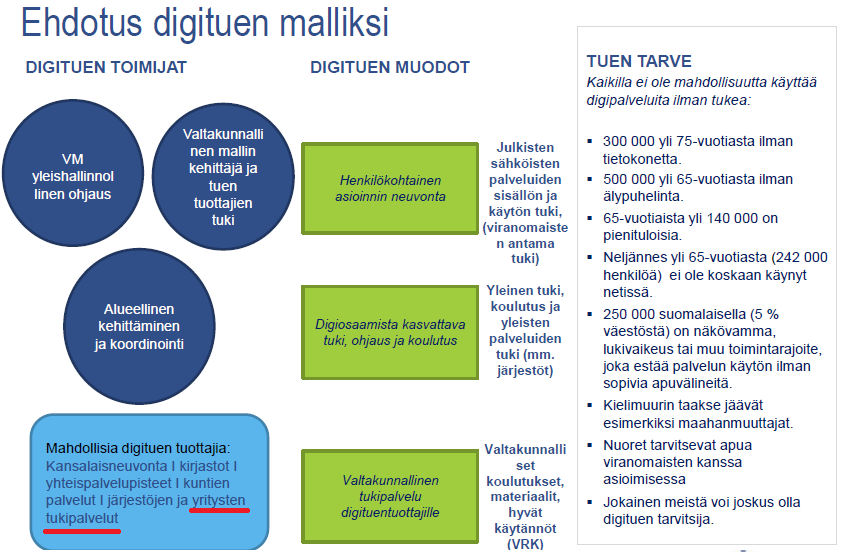Startups and SMEs are considered the backbone of any growing economy. As a collaborative entity, research-oriented universities (LUT) and polytechnic schools (LAMK & SAIMIA) can boost business ecosystems by providing fuel in the form of innovations.
Authors: Afnan Zafar and Marja Ahola
Why are startups and SMEs important for regional and national growth?
There is growing interest in innovations across the globe, irrespective of the size and origin of the country in question (Ghisetti et al. 2015). While multinational companies (MNCs) struggle to find innovative products (Jay 2013), the focal point has shifted toward startups and small and medium-sized enterprises (SMEs) (Rosenbusch et al. 2011). The freedom to explore new ideas in startups and SMEs is becoming ever more important. They are acting as drivers for regional and national innovation systems and leading to economic growth for emerged or emerging markets (Hessels & Parker 2013). After the 2007 economic crisis, most economies learned the important lesson of not relying solely on MNCs for economic growth (Helleiner 2011).
Countries have shifted their focus more towards promoting startups and SMEs to achieve longer and more stable economic growth (Ciravegna et al. 2014). There has also been a shift observed from industry-driven, incentive-based to regional and national economic policies with long-term planning (McCann & Ortega-Argilés 2013). Groupings of similar SMEs, strong funding bodies for innovation needs, single governing bodies and openness among firms to collaborate are the most important initiatives many countries have followed to achieve remarkable growth (Gunasekara 2005). Many countries have formed clusters of startups and SMEs at the regional level, referred to as ecosystems (Kanter 2012). These ecosystems have been proven to function as factories of new ideas and innovative products over the last decade (Triguero et al. 2013).
In Europe, it is evident that startups and SMEs are key players when it comes to their economic contribution at the national and EU level (Mrva & Stachová 2014). Finland is not an exception; after the well documented problems faced by Nokia, the need to expand startup and SME ecosystems both vertically and horizontally became apparent (Zafar 2018). Startups and SMEs produce approximately 60% of EU GDP, employ around 100 million people, generate about € 3,934 billion and are considered as an innovation powerhouse of the EU (Eurostat 2015). The main players in startup and SME ecosystems are Malta, Cyprus and Estonia (Eurostat 2015) while Finland, one of the world’s most innovative countries, lags behind (Filippetti & Archibugi 2011).
How can LAB boost development of startup and SME ecosystems?
Research-based educational institutes in any country are always considered the lifeline for innovative ideas (Bozeman et al. 2012). In Finland, institutes play a vital role in developing entrepreneurial competencies and have introduced many programs at bachelor and master levels to train future entrepreneurs. Due to changing dynamics, it is now time for institutes to merge and collaborate on a single agenda of economic growth with the help of startups and SMEs. LAB is now the flag bearer for such open innovation collaboration (Zafar & Ahola 2019). LAB is the result of the merger between LAMK and SAIMIA and will influence R&D in the South Karelia and Päijät-Häme regions and then later at the national level. These regions have great potential to develop, align and enhance startup and SME ecosystems (Ministry of Employment and the Economy 2019a & 2019b). As mentioned earlier, startups and SMEs have the natural ability to bring innovative products to the market. However, initially it is very difficult for them in this region (South Karelia/Päijät-Häme) to take the initiative alone. Here, LAB can play a key role in boosting the creation of startup and SME ecosystems by fueling them with initial research-based innovation and helping them to develop business plans.

Figure 1. LAB as a booster of business ecosystems (Figure: Afnan Zafar 2019).
At the backend, LAB can enable startup and SME ecosystems (Figure 1) to materialize product plans and service development and at a later stage market them (service/product) successfully. LAB can also play a role in post-market surveillance with firms for innovative products.
How can LAB be a game-changer at the national level?
It is evident from the literature that educational institutes are an important pillar in the growth of a country’s economy (Bozeman et al. 2012). They not only educate the nation but also play an important role in knowledge creation. When LAB successfully helps to develop the regional ecosystems in South Karelia and Päijät-Häme, which are just 150 km apart from each other and 90km from the Uusimaa region, it will start to emerge as a major national game-changer for the economy. LAB will act as an umbrella, under which regional strategic focus will be discussed, evolved, implemented and analyzed (Zafar & Ahola 2019). The well-aligned strategic focus will influence national policymaking and strategic focus and vice versa. However, as a bigger influencer in the future, more responsibility will fall on LAB’s shoulders to initiate, develop and execute R&D and business activities.
Startup and SME ecosystems are a win-win situation for all stakeholders
The level of knowledge and innovativeness is a key factor for the success of SME and startup ecosystems. The competitive advantage of such ecosystems is directly related to the role of each stakeholder (Gunasekara 2005). In this case, LAB (LAMK and SAIMIA) and the startups and SMEs themselves all are stakeholders. LAB has extensive experience related to entrepreneurship and innovations. It will play a lead role in future business ecosystems. Nevertheless, firms also have to respond positively to make this happen. LAB can learn the practical aspects of industry from firms, and firms can have initial R&D support from LAB. All growing economies have active collaborative ecosystems among various research institutes, startups, SMEs and MNCs (Kanter 2012). Responsible roles played by each stakeholder (LAB & firms) can lead to a win-win situation for all as the ecosystem will provide an open innovation environment so all stakeholders can learn from one another and grow together (Zafar 2019).
Conclusion
This article explores the possible future influence of LAB at the regional and national levels in Finland. The overall discussion shows that LAB can boost the creation of startups and SMEs due to its extensive collaboration with three main institutes. These three institutes have experienced RDI experts and extensive accomplishments in research. It is important to align the strategic focus of research with the needs of regional startups and SMEs. There should be set guidelines and SOPs before the actual collaboration starts to get the best results in the form of successful business ecosystems. The well-planned execution of LAB and its scope will definitely prove to be a game-changer for regional and national economic growth in the long run.
References
Bozeman, B., Fay, D. & Slade, C. 2012. Research collaboration in universities and academic entrepreneurship: the-state-of-the-art. The Journal of Technology Transfer. Vol. 38(1), 1-67. [Cited 6 Sep 2019]. Available at: https://doi.org/10.1007/s10961-012-9281-8
Ciravegna, L., Lopez, L. & Kundu, S. 2014. Country of origin and network effects on internationalization: A comparative study of SMEs from an emerging and developed economy. Journal of Business Research. Vol. 67 (5), 916-923. [Cited 8 Sep 2019]. Available at: https://www.sciencedirect.com/science/article/abs/pii/S0148296313002762
Eurostat. 2015. Small and medium-sized enterprises: an overview. [Cited 10 Sep 2019]. Available at: https://ec.europa.eu/eurostat/web/products-eurostat-news/-/EDN-20181119-1
Filippetti, A. & Archibugi, D. 2011. Innovation in times of crisis: National Systems of Innovation, structure, and demand. Research Policy. Vol.40 (2), 179-192. [Cited 9 Sep 2019]. Available at: https://www.sciencedirect.com/science/article/pii/S0921800913001389
Ghisetti, C., Marzucchi, A. & Montresor, S., 2015. The open eco-innovation mode. An empirical investigation of eleven European countries. Research Policy. 44, 1080-1093. [Cited 10 Sep 2019]. Available at: https://www.sciencedirect.com/science/article/abs/pii/S0048733314002194
Gunasekara, C. 2005. Reframing the Role of Universities in the Development of Regional Innovation Systems. The Journal of Technology Transfer. 31, 101-113. [Cited 10 Sep 2019]. Available at: https://eprints.qut.edu.au/1008/
Hessels, J. & Parker, S. 2013. Constraints, internationalization and growth: A cross-country analysis of European SMEs. Journal of World Business. Vol. 48 (1), 137-148. [Cited 11 Sep 2019]. Available at: https://www.sciencedirect.com/science/article/pii/S109095161200051X
Helleiner, E. 2011. Understanding the 2007–2008 Global Financial Crisis: Lessons for Scholars of International Political Economy. Annual Review of Political Science. 14, 67-87. [Cited 8 Sep 2019]. Available at: https://www.annualreviews.org/doi/abs/10.1146/annurev-polisci-050409-112539
Jay, J. 2013. Navigating Paradox as a Mechanism of Change and Innovation in Hybrid Organizations. Academy of Management Journal. 56, 137-159. [Cited 9 Sep 2019]. Available at: https://journals.aom.org/doi/abs/10.5465/amj.2010.0772
Kanter, R. M. 2012. Enriching the Ecosystem. Harvard Business Review. Vol. 90 (3). [Cited 11 Sep 2019]. Available at: https://www.hbs.edu/faculty/Pages/item.aspx?num=42372
McCann, P. & Ortega-Argilés, R. 2013. Smart Specialization, Regional Growth and Applications to European Union Cohesion Policy. Regional Studies. Vol. 49 (8), 1291-1302. [Cited 9 Sep 2019]. Available at: https://www.tandfonline.com/doi/abs/10.1080/00343404.2013.799769
Mrva, M. & Stachová, P. 2014. Regional Development and Support of SMEs – How University Project can Help. Procedia – Social and Behavioral Sciences. 110, 617-626. [Cited 8 Sep 2019]. Available at: https://core.ac.uk/download/pdf/82362862.pdf
Ministry of Employment and the Economy. 2019a. South Karelia’s regional programme 2014−2017: South Karelia to be Finland’s most success region by 2030. [Cited 12 Sep 2019]. Available at: https://www.rakennerahastot.fi/web/en/south-karelia
Ministry of Employment and the Economy. 2019b. Päijät-Häme regional programme 2017: Internationalisation and expertise networks. [Cited 12 Sep 2019]. Available at: https://www.rakennerahastot.fi/web/en/paijat-hame
Rosenbusch, N., Brinckmann, J. & Bausch, A. 2011. Is innovation always beneficial? A meta-analysis of the relationship between innovation and performance in SMEs. Journal of Business Venturing. Vol. 26 (4), 441-457. [Cited 13 Sep 2019]. Available at: https://www.sciencedirect.com/science/article/abs/pii/S0883902609001232
Triguero, A., Moreno-Mondéjar, L. & Davia, M. 2013. Drivers of different types of eco-innovation in European SMEs. Ecological Economics. 92, 25-33. [Cited 12 Sep 2019]. Available at: https://www.sciencedirect.com/science/article/pii/S0921800913001389
Zafar, A. 2018. Aivovuoto Suomessa – todellinen uhka vai myytti? Siirtolaisuus Migration 4/2018. Siirtolaisuusinstituutin julkaisu. [Cited 12 Sep 2019]. Available at: http://www.migrationinstitute.fi/files/pdf/siirtolaisuus-migration/sm4_2018.pdf
Zafar, A. & Ahola, M. 2019. Merging and Collaboration of Educational Institutes: New dimension of Open Innovation. LAMK Pro. [Cited 11 Sep 2019]. Available at: http://www.lamkpub.fi/2019/09/09/mergingand-collaboration-of-educational-institutes:-new-dimension-of-open-innovation
Zafar, A. 2019. The Outsourcing Innovation Paradox: A Company’s Growth Option or a Risk to R&D Capabilities. Doctoral dissertation. University of Vaasa, School of Technology and innovations. Vaasa. Acta Wasaensia, 418. [Cited 8 Sep 2019]. Available at: http://urn.fi/URN:ISBN:978-952-476-853-5
Authors
Afnan Zafar, Ph.D., works as a research fellow at the University of Vaasa, Finland and as a private research consultant. His areas of expertise are innovative solutions, innovative product and service development, brain drain problems and its solutions in developed countries
Marja Ahola, MA, works as an RDI expert at Lahti University of Applied Sciences, as an expert in entrepreneurship education for highly educated immigrants (Kokoma ESF) and as a project manager in the Ossi 2 – Skills for a Work project
Illustration: https://pxhere.com/en/photo/1433463 (CC0)
Published 26.9.2019
Reference to this publication
Ahola, M. & Zafar, A. 2019. LAB: Boosting Startup and SME Ecosystems in the South Karelia and Päijät-Häme Regions. LAMK Pro. [Cited and date of citation]. Available at: http://www.lamkpub.fi/2019/09/26/lab-boosting-startup-and-sme-ecosystems-in-the-south-karelia-and-paijat-hame-regions/













